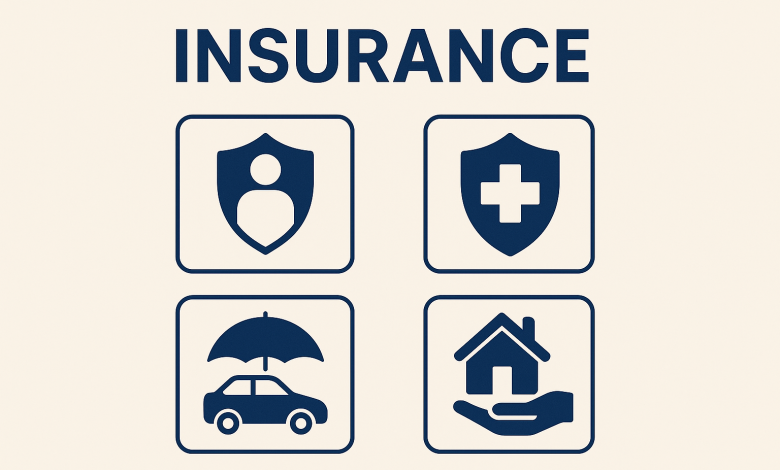
What is Insurance?
Insurance is a financial product that provides protection against potential future losses. By paying a small premium, you can secure yourself, your assets, and your family from unexpected events like accidents, illnesses, natural disasters, or even death. Essentially, insurance acts as a safety net to manage financial risks and ensure peace of mind.
Why is Insurance Important?
-
Financial Security:
Life is unpredictable. Whether it’s a medical emergency, a car accident, or damage to your property, insurance helps cover the costs, preventing financial burden. -
Legal Requirement:
Some insurance types, such as auto insurances, are legally required in many countries to protect third-party liability. -
Peace of Mind:
Knowing that you are covered in case of an unforeseen event reduces stress and allows you to live more confidently. -
Asset Protection:
Insurances helps protect high-value assets like homes, cars, and businesses from losses due to damage, theft, or liability claims.
Main Types of Insurance
1. Life Insurance
Life insurances provides financial compensation to your beneficiaries in the event of your death. It is essential if you have dependents, as it ensures they are financially supported in your absence.
Popular Life Insurance Types:
-
Term Life Insurance: Coverage for a specific period.
-
Whole Life Insurance: Lifetime coverage with a savings component.
-
Universal Life Insurance: Flexible policy with investment options.
2. Health Insurance
Health insurances covers medical expenses, including hospital stays, surgeries, and doctor visits. It is crucial in countries with expensive healthcare systems.
Key Benefits:
-
Coverage for hospitalization and surgeries
-
Outpatient care and prescription drug benefits
-
Preventive health checkups
3. Auto Insurance
Auto insurances protects you against financial losses due to car accidents, theft, or damage.
Coverage Includes:
-
Liability coverage
-
Collision coverage
-
Comprehensive coverage
4. Home Insurance
Homeowners insurances protects your home and belongings from natural disasters, fire, theft, or vandalism.
Key Coverage Areas:
-
Building structure
-
Personal belongings
-
Liability for injuries on property
5. Travel Insurances
Travel insurances offers protection against trip cancellations, medical emergencies abroad, and lost baggage. It is highly recommended for international travel.
6. Business Insurances
Business insurance provides coverage for various risks like property damage, liability claims, employee-related risks, and business interruption.
Benefits of Having Insurance
-
Risk Management: Spreads the risk between the insurer and the insured.
-
Savings and Investment: Some policies offer maturity benefits and returns on premium payments.
-
Legal Protection: Many policies provide coverage for legal expenses arising from disputes or liability claims.
-
Credit Improvement: Lenders often prefer insured individuals or businesses, improving your chances of getting loans.
How to Choose the Right Insurance Policy
Choosing the right insurances policy can be overwhelming. Here are some tips to simplify the process:
1. Assess Your Needs
Start by evaluating what you need coverage for—health, life, property, or business. Prioritize your requirements based on financial risks and family obligations.
2. Compare Policies
Use online tools and comparison websites to evaluate different policies based on premium costs, coverage options, and customer reviews.
3. Understand the Terms
Carefully read the policy documents. Pay attention to:
-
Premium amount
-
Coverage limits
-
Inclusions and exclusions
-
Claim process
-
Renewal terms
4. Check the Insurer’s Reputation
Choose a well-established insurances provider with a strong claim settlement ratio and positive customer feedback.
5. Consult an Expert
If you’re unsure, consult an insurances advisor to understand complex terms and choose the best plan based on your profile.
Common Myths About Insurances
Myth 1: Young and healthy people don’t need insurance.
Truth: Accidents and illnesses can happen at any age. Early insurance is also cheaper.
Myth 2: Insurances is a waste of money if you don’t make a claim.
Truth: Insurances is about protection, not profit. Not using it means you’ve been lucky—not wasteful.
Myth 3: All policies cover everything.
Truth: Every policy has exclusions. Always read the fine print to know what is and isn’t covered.
Tips for Saving on Insurance Premiums
-
Buy online: Many insurers offer discounts for online purchases.
-
Bundle policies: Combine auto, home, and other insurance for multi-policy discounts.
-
Increase deductibles: A higher deductible lowers your premium.
-
Maintain a good credit score: A better score often leads to better rates.
-
Avoid unnecessary add-ons: Choose only essential riders or benefits.
Final Thoughts
Insurances is not just a financial product; it’s a pillar of financial planning. Whether you’re safeguarding your health, protecting your family, or securing your assets, having the right insurance can make a huge difference. Don’t wait for a disaster to strike—invest in the right coverage today and enjoy lasting peace of mind.


